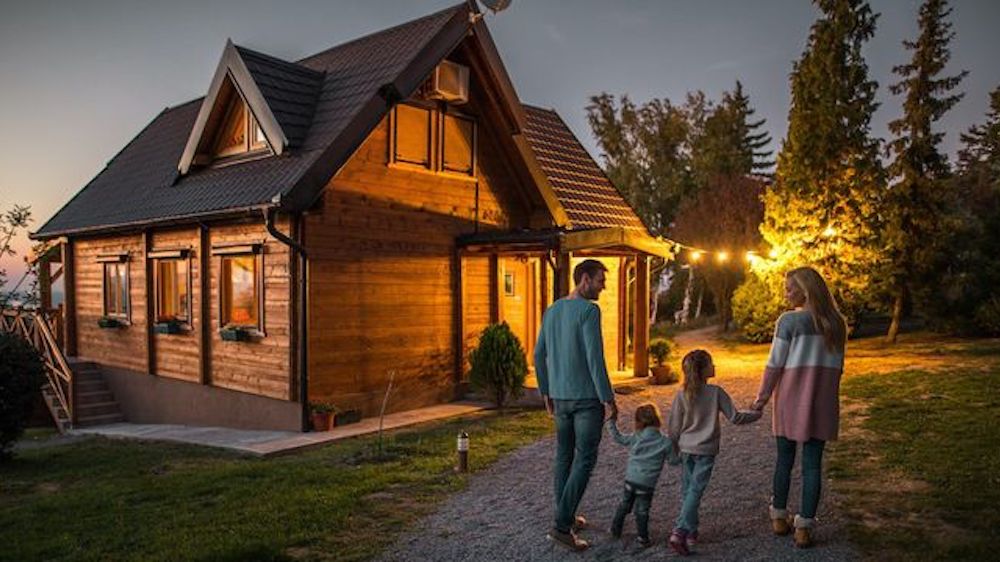Second Home vs. Investment Property: What’s the Difference?
You hear these terms thrown around all the time: Second home, investment property, vacation home, rental property. But is there any real difference among them? And does it even matter what you call it?
As it turns out, there are some very big differences between second homes and investment properties, especially if you are financing it.
“Both are fantastic ways to build wealth over time by capturing the appreciation of a real asset,” says Tony Julianelle, CEO of Atlas Real Estate in Denver. However, “both come with inherent risks and expenses that should be carefully considered when making a purchase.”
As with any real estate transaction, you’ll want to do your homework and make a smart choice for your wallet, no matter which path you go down. We chatted with experts to get the scoop.
What is a second home?
A second home is just that: a second property where you and your family spend time, away from your primary home. You might also hear a second home referred to as a vacation property. You may rent it out for a few days each year on Airbnb or VRBO, but you primarily use it yourself.
Buying a second home makes financial sense if there’s one particular vacation spot you visit regularly. Why spend a fortune on hotels or Airbnb when you can own your own piece of paradise that will hopefully appreciate in value over time?
“Let’s say you live in San Francisco, but you are an avid skier in the winter and like to hike in the summer,” says Rachel Olsen, a real estate agent in California. “If you spend many weekends and vacations in Lake Tahoe, it may make sense to purchase a second home there.”
What is an investment property?
An investment property, on the other hand, is one that you purchase with the explicit intention of generating income. The investment property could be right next door to your own home, or it could be in another state—it doesn’t really matter. You’ll be playing the role of landlord, with long-term or short-term renters paying cash to stay in the home.
“Never forget that an investment property is all about the Benjamins,” says Lamar Brabham, CEO and founder of financial services firm Noel Taylor Agency. “The entire point is to turn a profit. No emotions, no affection.”
Before making an offer on an investment property, you’ll want to crunch the numbers to make sure it’s a solid investment. Similarly, consider what factors will be important to prospective tenants (e.g., access to public transportation, good schools, parking, and low crime rates).
How to finance a second home or investment property
If you’re paying cash, you can skip this section. But if you need a mortgage for your new property, you should know that financing a second home or investment property is very different from financing a primary residence. And, while mortgages on second homes and investment properties have some similarities, there are also some key differences.
- Interest rate: You can expect to see a higher interest rate for both second homes or investment properties than for primary homes. Why? Because lenders view those transactions as riskier. If you get into a tight spot with money, you’re far more likely to stop paying the mortgage for your second/investment property than for your primary home.
- Qualifying: Whether you’re buying a second home or an investment property, you might need to do some extra legwork in order to qualify for that second loan. Your bank may require you to prove that you have healthy cash reserves (so it knows you can afford both mortgages). It’ll take a long, hard look at your overall financial situation, so be sure everything is on the up and up before you apply.
- Down payment: Depending on your situation and the lender, you might also need to bring a larger down payment to the table for an investment property or second home, typically 15% to 25%. Again, this is because the bank wants a bigger cushion to fall back on in case you default.
- Rental income: If you’re buying an investment property, your lender might allow you to show that anticipated rental income will help cover the mortgage payments. However, proving how much rental income the home will generate can be complicated. Prepare to pay for a specialized appraisal that takes into account comparable rents in your area.
- Location: Your lender may require a second home to be 50 to 100 miles away from your primary home. An investment property, however, can be anywhere in comparison to your primary home, even next door.
- Taxes: Federal income tax rules are different for vacation homes and investment properties. Generally, you’ll treat your second home just as you would your first home when it comes to taxes—if you itemize, you can deduct the mortgage interest you paid up to a certain limit. (The rules vary if you rent out your second home for part of the year.) If you own an investment property, you get to deduct the mortgage interest, plus many of the expenses that come with operating a rental business, but you also have to report your rental income, too.
Why it’s important to not confuse the two
It’s important that you’re totally clear about the difference and not use the terms “second home” and “investment property” interchangeably. Some people try to pass off their investment property as a second home to get more favorable financing, but you should never do this.
If you lie on your loan application, you could be committing mortgage fraud, which is a federal offense.
Your lender’s underwriting team is aware of this possibility, so don’t try to pull the wool over their eyes. They’ll take the big picture into account when deciding what loan terms to offer you, says real estate attorney David Reischer.
“A single-family residence by a lake that is located in a completely different state from the borrower’s primary residence is much more acceptable to be categorized as a second home by a bank underwriter,” he says. “A multifamily-unit property with rental income in an urban area is likely to be treated as an investment property.”
Bottom line: Keep everything aboveboard, and you won’t have to worry about a thing.
The post Second Home vs. Investment Property: What’s the Difference? appeared first on Real Estate News & Insights | realtor.com®.
Who Pays the Home Buyer's Agent?
 Both seller's agent fees and buyer agent's fees are part of a typical real estate transaction and are included in the final negotiated purchase price of the property. There should be no additional fees to the buyer for a buyer's agent above and beyond the negotiated purchase price of a home unless specifically agreed in writing between the buyer and agent before an offer is made.
Both seller's agent fees and buyer agent's fees are part of a typical real estate transaction and are included in the final negotiated purchase price of the property. There should be no additional fees to the buyer for a buyer's agent above and beyond the negotiated purchase price of a home unless specifically agreed in writing between the buyer and agent before an offer is made.
In most cases, the seller's agent pays the buyer's agent for bringing the buyer, negotiating the purchase price and terms, writing a legally correct offer, coordinating inspections, responses, and financing plus handling numerous additional details on the buyer's side of the transaction.
Buyers should avoid contacting seller's agents and sellers directly unless they are comfortable negotiating and representing themselves. That is why it is important for buyers to choose their agents BEFORE they begin looking at homes or as soon as possible if they have begun looking.
Did you know that fewer than one percent of the agents and brokers in Massachusetts have committed to being 100% loyal to their buyers 100% of the time?
To learn more about the pros and cons of various types of buyer agents, or to get a list of experienced local 100% loyal buyer's agents to interview without obligation, click the button below.
Find a Great Buyer Agent!
Selecting the Right Homebuyer's agent
 Unlike most other real estate agents, a MABA home buyer's broker never represents both a buyer and seller in the same transaction so you never have to worry whether a MABA agent is really looking out for your best financial interests. A MABA buyer's agent acts as your advocate, real estate educator, advisor and negotiator, always loyal to you and dedicated to helping you find and buy the best home with the best terms at the price and showing you which homes to avoid along the way.
Unlike most other real estate agents, a MABA home buyer's broker never represents both a buyer and seller in the same transaction so you never have to worry whether a MABA agent is really looking out for your best financial interests. A MABA buyer's agent acts as your advocate, real estate educator, advisor and negotiator, always loyal to you and dedicated to helping you find and buy the best home with the best terms at the price and showing you which homes to avoid along the way.
Fewer than one percent of the agents and brokers in Massachusetts meet our high standards.
Whether you are ready to buy now or just beginning your home buying journey, click here to choose a Great Buyer's Agent to answer all of your home buying questions!
Article From: "Sarah Kuta" Read full article
Get Started with MABA
For no extra cost, let a MABA buyer agent protect your interests



